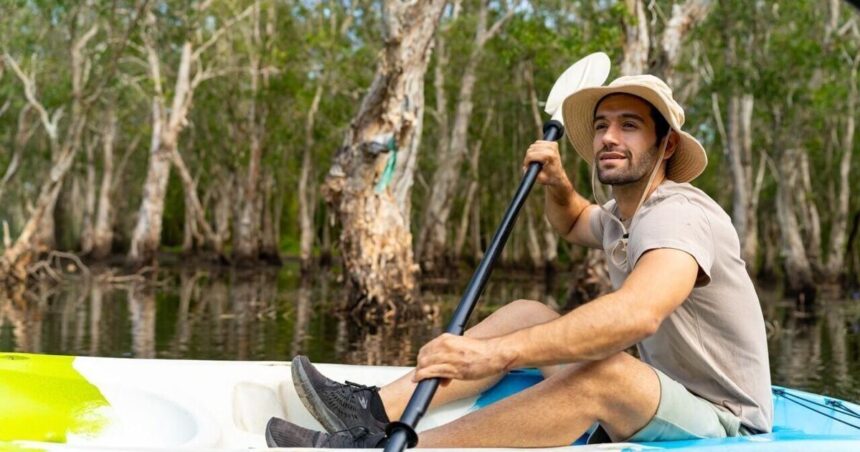Despite the 2020 lockdown on global tourism and continued fears over new COVID strains, the hospitality industry is on more than a rebound — it’s booming, according to the Research and Markets 2024 “U.S. Sustainable Travel Market” survey. Ecotourism (or sustainable tourism) is also rising, with an expected growth of over $50 billion by 2029.
The increase in ecotourism has been brewing for a few years. A 2022 survey found that more than 80% of travelers believed ecotourism to be important. While hotels and resorts continue to adjust to the ever-changing industry, they must consider consumer wants and expectations. This means the creation of more opportunities for guilt-free getaways and the option to leave a reduced carbon footprint without sacrificing the creature comforts of travel.
Eco-friendly stays are the crossroads for comfort and sustainability. Effective ecotourism is a mutual effort that requires even travelers to be mindful of the environmental impact of their travel decisions.
Who Is Driving Ecotourism
The Research and Markets survey notes that while travelers of all ages show interest in ecotourism, one specific generation drives the industry. Making up the “fastest-growing segment” of ecotourists, millennials tend to value authenticity, pushing them to favor alternative methods of tourism, such as ecotourism.
As of 2023, female travelers are the leading segment responsible for the boom in sustainable travel. Women’s concern for how travel impacts the social and environmental elements of their destination led to more female tourists adopting eco-friendly habits. A 2022 study on the division of genders and their concern over their environmental impact supports the idea that female travelers care more about ecotourism, eco-friendly legislation, and bans.
Above all, though, group travelers trend as the most eco-conscious while making travel arrangements. According to the 2023 report, 85% of the sustainable travel market was made up of groups: families and corporate gatherings. This segment offers the most diverse range of travelers, requiring accommodations and experiences to expand their eco-friendly options to include broad, age-appropriate activities.
Hotels and Resorts Need To Invest in Eco-Friendly Accommodations
Ecotourists want authentic cultural experiences that touch on the fundamentals of ecotourism. These include investing in local communities while minimizing the negative impact of travel and educating travelers on these principles. Whereas traditional resorts tend to offer a glossy, extravagant experience brimming with opulent adornments, ecotourism favors biodiversity and natural authenticity.
With so many people invested in reducing their carbon footprint and travel-related waste generation, hotels and resorts must adapt. The hospitality industry has multiple pathways to reduce its energy emissions. These start with implementing energy-efficient practices and using more renewable resources.
UNESCO’s World Heritage Convention lays out the importance of infrastructure to sustainable tourism in its six-step “Guide 6.” The plan covers improvements to waste management, the reduction of all forms of pollution, including noise, and managed water usage. For example, the installation of low-flow plumbing systems or motion-activated lighting in guest rooms reduces each guest’s carbon footprint.
Focus on Offering Unique Experiences
Hotels and resorts can help promote eco-friendly tourism, but they’re just one part of the equation. What individuals do at their destination can also be tailored to fit within the boundaries of sustainable tourism. These unique experiences can double as opportunities for cultural exploration, introducing travelers to otherwise unfamiliar lands and practices.
Activities like wildlife safaris, nature hikes, and cultural centers allow travelers to connect with nature and local communities. For service-oriented travelers, voluntourism allows visitors to participate in conservation and community development. Partnering with nonprofits and local organizations extends the benefits of tourism to the area.
According to Research and Markets, group travelers seek accommodations and activities that support community engagement and responsible tourism. Sustainable travel providers have fostered family and group-friendly eco-resorts and accommodations that offer environmentally conscious activities suitable for various ages and interests.
Sustainable Tourism Supports Local Communities
Traditional tourism typically benefits the local community financially. It can also negatively impact the local ecosystem, offsetting any potential gains. In some destinations like Hawaii, residents have been known to try to turn tourists away with unwelcoming signs. Effective, sustainable tourism can create a more positive relationship between travelers and communities, even in more delicate ecosystems.
Travelers can substitute extravagant vacations for more simplistic getaways centered around eco-friendly accommodations like ecolodges. They can also swap out pollution-heavy transportation like gas-powered rental cars for electric vehicles, public transit, or bicycles. It’s difficult to leave a zero carbon footprint behind, but even minor efforts from tourists to change their behaviors and acknowledge the mutual perks of ecotourism will be an improvement.
It’s not just tourists that can make changes to help local communities. Travel providers have multiple avenues to adjust their practices to align with ecotourism. In some destinations, hotels could make an effort to provide locally sourced food. They can even incorporate local culture by engaging guests in an optional interactive activity, like picking the fruit used for that day’s dinner.
Supporting local agriculture is only one component of community building in which hotels could participate. Ecotourism offers the chance to expand businesses by employing native tour guides. Hosting events with local artisans, such as cooking regional food or making a keepsake based on native traditions, extends ecotourism’s impact without hindering the guest experience.
Traveling With the Planet in Mind
As tourists clamor for meaningful, impactful trips with minimal environmental impact, hotels and travel providers must adapt. The desire for curated, memorable stays and activities gives the hospitality industry ample opportunity to innovate.
Accommodations can focus on energy efficiency, support the local economy, and make future commitments to sustainable practices that appeal to ecotourists. Sustainable travel isn’t a mere cash grab or buzzword but a chance for travelers and hotels to take more responsibility for the excesses of global tourism.





